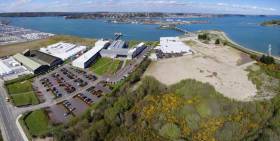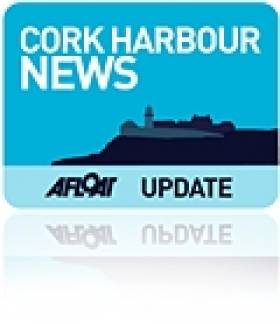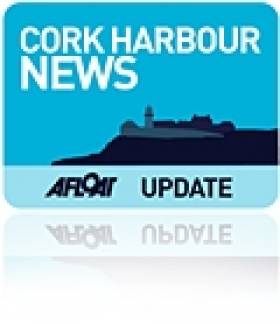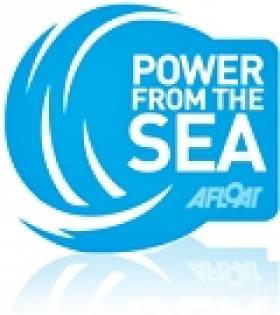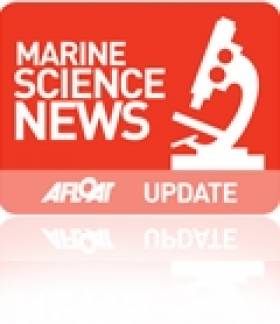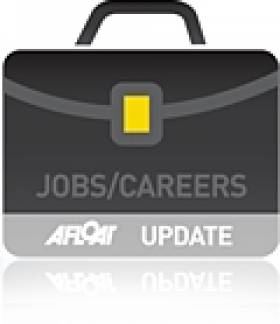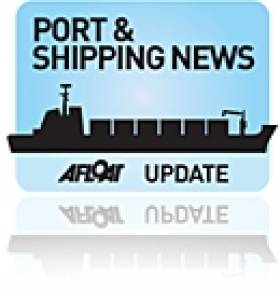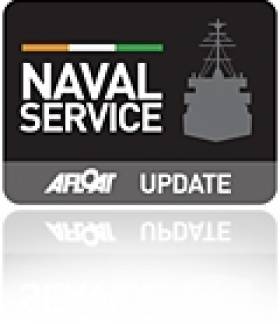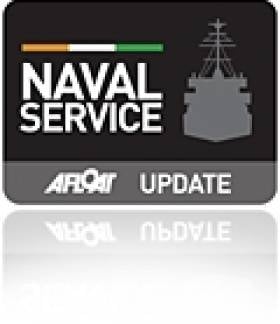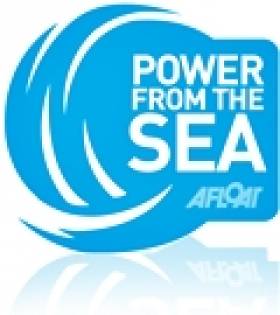Displaying items by tag: IMERC
FOI Docs Show Naval Service Upset Over IMERC Shutdown
#IMERC - Documents seen by the Irish Examiner show that the Naval Service was against the shutting of the Irish Marine and Energy Research Cluster (IMERC) earlier this year.
A joint marine research initiative of CIT’s National Maritime College of Ireland, UCC’s MaREI Centre for Marine and Renewable Energy and the Naval Service, IMERC was wound down on the foot of a 2016 report commissioned by the two colleges which concluded it was “not fit for purpose”.
But records obtained under the Freedom of Information Act show that navy officials believed the decision was “short-sighted” and “did not highlight the substantial achievements and impacts of IMERC” since it was established in 2011.
Moreover, it was claimed the report that prompted the decision to disband the Cork Harbour-based initiative was flawed, containing a number of inaccuracies — a sentiment shared by business start-ups using the cluster.
The Irish Examiner has much more on the story HERE.
#haulbowline – Marine minister Simon Coveney says there has been no final decision taken on an 'Ocean Yacht Racing Hub' within the Naval Service base at Haulbowline island in Cork Harbour.
In this morning's Irish Times newspaper, marine correspondent Lorna Siggins writes that a British yacht racing consultancy has met Government agencies as part of a 'grand plan' for haulbowline island, site of a former steelworks site. The plan for the yacht base was first mooted by British solo racer Alex Thomson when he called into to Cork Harbour for repairs last April before heading across the Atlantic Ocean.
As Afloat.ie reported last October, Thomson, together with his shore manager Stuart Hosford, a Cork native, returned to the harbour and gave a public lecture about his solo sailing success that also included comment about the potential to develop the harbour site. The visit was part of an 'Innovation Week' in Cork where Cork Institute of Technology, the Irish Naval Service and University College Cork promoted the first Imerc Innovation Week.
Interest in the Haulbowline site focuses on the substantial graving dock where large yachts measuring up to over 100–foot in length or more could be lifted in an out of the water in a deep water environment with convenient access to the Atlantic.
Haulbowline has been making headlines for years because of cancer-causing residue, left over from the Irish Steel plant that once occupied the land. It has been confirmed that a cache of 500,000 tonnes of slag and toxic waste material were buried at the former steelworks. Afloat reported on the hot site in the harbour in 2011.
More in the Irish Times on the Yacht Hub story here.
80 Marine Jobs For Cork Harbour
#corkharbour – Minister for Agriculture, Food, the Marine and Defence Simon Coveney, T.D. today announced the creation of more than 80 new jobs in the marine energy sector for Cork Harbour today.
The US ocean energy company, Resolute Marine Limited, will create 80 new jobs over the next 5 years, as it establishes its European headquarters in Cork. Exceedence Ltd, a spin out from UCC's Beaufort Research Centre, will create 5 new jobs in the marine renewable energy financial consultancy in 2015, while Resolve Marine, a global salvage company, will create up to 6 jobs in the next 12 months in its European headquarters located in Cork Harbour.
Speaking at Energy Cork - IMERC "Cork Harbour – Energising the Region" conference at the Irish Maritime and Energy Resource Cluster (IMERC) campus in Ringaskiddy, Minister Coveney, T.D. welcomed the significant job creation in the sector, stating:
"It is clear that the decision to establish a dedicated marine cluster at Cork Harbour is encouraging private sector investment and leading to the creation of a significant number of high quality jobs. I have always been convinced that the unique collaborative nature of IMERC would create the right momentum for such investment and ensure that this campus becomes a major player in the international marine sector. I wish these new companies continued success in the future."
Energy Cork and IMERC also welcomed an announcement by Chairman of The Port of Cork, John Mullins, that a significant site in Cork Harbour is to be designated as Ireland's first offshore oil and gas services hub, which will reinforce the positioning of Cork Harbour as a leading marine and energy capital in Europe.
Speaking at the Energy Cork - IMERC conference, Michael Quirk acknowledged the collective responsibility and collaboration of industry, energy and tourism sectors for the major positive developments taking place in Cork Harbour.
"Cork Harbour not only provides more than one third of Ireland's energy requirements, it is also a first-class model for how society, academia and industry can work together to significantly enhance a region's attractiveness as a location for further investment while maintaining and supporting a green agenda. Nowhere is this more evident that the stunning harbour of Cork which provides huge employment, energy needs and nonetheless tourism and leisure amenities," said Michael Quick, Conference Chair and Vice Chair of Energy Cork.
is a subsidiary of Boston-based Resolute Marine Energy, Inc. and is the developer of an innovative wave-powered desalination system (Wave2OTM) that is a cost-effective solution for water shortages in many developing countries and remote communities throughout the world.
Resolute Marine Limited is a subsidiary of Boston-based Resolute Marine Energy, Inc. and is the developer of an innovative wave-powered desalination system (Wave2OTM) that is a cost-effective solution for water shortages in many developing countries and remote communities throughout the world.
Resolute Marine Energy CEO Bill Staby said: "We're confident our decision to set up our European operations in Cork is a good one. We have positioned ourselves in the middle of a maritime innovation hub that will yield great benefits for our company over time. We expect to create 25 new high-paying technical jobs over the next 2 years in Cork and as many as 50 additional jobs in Ireland as the company's manufacturing operations expand to meet anticipated demand. A key attraction is our ability to draw upon the many years of accumulated experience in marine renewable energy research and development present in many of the leading Irish universities and research centres through our base at IMERC."
Exceedence CEO Dr. Ray Alcorn is a leading figure in ocean energy space, and his company will provide consultancy services on investment in marine renewable energy.
"We are delighted to join the IMERC cluster in Cork Harbour, we hope to use our expertise and experience and leverage off our location to grow our business," said Dr Ray Alcorn, Exceedence Ltd.
Resolve Marine CEO Joe Farrell explained that he was attracted to Cork because of the talent pipeline in the marine energy cluster of Cork Harbour, in particular IMERC at the National Maritime College of Ireland and the Irish Naval Service.
Resolve Marine was recently involved in the salvaging of the Costa Concordia cruise liner off the Italian coast, as well as the MV Rena in New Zealand. The company has established its European operations centre in Cork and is working closely with marine robotics teams in IMERC and University of Limerick for Remotely Operated Vehicles (ROV) for salvage operations.
#energy – A major energy conference entitled "Cork Harbour – Energising the Region" will be held in Cork this week, to discuss the opportunities and challenges in terms of energy, industry and tourism for the Harbour.
Providing more than one third of Ireland's energy requirements, the Harbour region is a vital element of Ireland's energy infrastructure and will be the focus of the the event hosted by Energy Cork and the Irish Maritime and Research Centre (Imerc) on Friday, 12 December 2014.
"From the legacy of a historic trading centre to today's modern port, Cork Harbour has become a world-class model of how industry, energy, tourism and leisure work together in harmony," explains Michael Quirk, Vice Chair of Energy Cork and conference co-ordinator. "A number of international and national speakers will discuss the success of Cork Harbour, as well as highlighting viable opportunities for future development."
A number of international speakers will address the event, including Gordon McIntosh of the Aberdeen City Council who will discuss the potential for Cork to become an oil and gas services hub. Aberdeen has been hugely successful and created enormous employment and wealth from their development as an oil, gas and offshore wind services hub in the UK. Hugo Niesen will discuss the Eharbours project, which may similarly provide new opportunities for Cork Harbour.
Cork Harbour is home to two major power stations, an oil refinery, a number of natural gas fields as well as several wind farms, and world-class marine renewable energy research centres. Cork Harbour's energy cluster will be a focus of the event, along with the region's industry, environment and green route energy opportunities.
"Cork is ideally placed to become a national hub for low-carbon vehicles, such as electric cars and gas powered buses. By implementing a number of policy measures, Cork is already leading the way for other Regions to follow in terms of green routes and energy efficiency in the Harbour," said Ian Kilgallon of Gas Networks Ireland, who will discuss the green route for the Harbour region.
Other speakers include Val Cummins of iMerc, Mike King of Phillips 66, Michael McCarthy of the Port of Cork, John Killeen of the Maritime Institute, John Mullins, Chair of Port of Cork and CEO of Amerenco. Minister for Agriculture, Food, the Marine and Defence, Simon Coveney, T.D. will also deliver the keynote address at the event.
The conference is free to attend, but registration is essential. For more information click here
New Marine Research Centre Means Jobs Boost For Cork
#MarineResearch - Up to 77 jobs may be be supported by a new €29 million research centre that's set to put Ireland at the cutting edge of the marine energy sector, as The Irish Times reports.
The SFI Research Centre, Marine Renewable Energy Ireland (MaREI) at University College Cork (UCC) will be part of the Irish Maritime and Energy Resource Cluster (IMERC), which had its annual conference in Cork Harbour last month.
Funded by €19 million from the Department of Jobs, Enterprise and Innovation via the Science Foundation Ireland (SFI), with €10.5 million more coming from industry partners, the new centre has the potential to make Ireland "an international focal point for the marine renewable industry", according to Research Minister Sean Sherlock.
Scientists at the centre will be working on the likes of new offshore wind, wave and other marine energy devices and related infrastructure, as well as new technology and materials to survive tough ocean conditions.
This summer Taoiseach Enda Kenny helped turn the sod on the Beaufort Building at UCC, which will be the flagship development of IMERC and brings together the Hydraulics and Maritime Research Centre (HMRC), Coastal Marine Research Centre (CMRC) and the Sustainable Energy Research Group (SERG) under one roof.
Maritime Jobs Focus at IMERC Annual Conference in Cork Harbour
#jobs – The potential of disruptive innovation to positively effect job creation in the maritime sector will be explored at the IMERC Annual Conference which takes place at the National Maritime College of Ireland in Ringaskiddy, Co. Cork on Monday 7th October. A disruptive innovation is an innovation which disrupts, improves and replaces an existing product, process, approach or idea over time in unexpected ways. IMERC, the Irish Maritime and Energy Resource Cluster, is a partnership between University College Cork, Cork Institute of Technology and the Irish Naval Service.
Speaking in advance of the conference, IMERC Director, Dr Val Cummins said: "Ireland currently derives just 1% of its GDP from the maritime sector. To put that figure in context, the UK derives 5%, Denmark 11% and Norway 20%. Ireland aims for 2.4% by 2030. The ideas and plans that will emerge from the IMERC Conference will be an important opportunity to drive growth in the figures for Ireland."
Ireland has the largest maritime area to land mass in the EU and is the third largest territory in the EU when its seabed is included. The maritime sector has huge growth possibilities for the Irish economy. This Conference is set to make a tangible contribution to the realisation of this potential by bringing together speakers and guests from North America and Europe from a range of backgrounds including industry, government, and academia, to discuss the role disruptive innovation can play in driving this sector. The conference will have an innovative format with audience engagement central and social media playing a vital role. IMERC is already making a big contribution to this sector with advanced plans for the development of a research and commercial campus in Ringaskiddy.
Dr Cummins continued, "There is a huge opportunity for Ireland to really benefit from its ocean resources in a planned manner for the first time in our history. The construction of the Beaufort Research Centre and the continuing ability of IMERC to attract new business are demonstrable indicators that IMERC is contributing to these aims."
IMERC's vision is to become a research and commercial cluster of world standing by realising Ireland's potential in the global, maritime and energy markets of tomorrow. See www.imerc.ie
Ports & Shipping Review. Cargoships, WFSVs, Cork Ferry, IMERC, Dutch Navy & Last H&W Ferry Sold
#PORTS & SHIPPING REVIEW - Over the last fortnight Jehan Ashmore reports from the shipping scene which saw a 'Pop-Up Village' delivered by cargoship to Galway Port in readiness for the Volvo Ocean Race festival which started yesterday and continues to 8 July.
Arklow Marine Services second wind-farm support vessel (WFSV) Gardian 10 was launched for UK owners and today the vessel travelled from Arklow to Belfast Port and berthed at the Abercorn Basin.
In the rebel county, efforts to revive the Cork-Swansea route took a new step when a group was formed to ascess the feasibility in re-launching the Celtic Sea link that closed last November after Fastnet Line went into examinership.
At the Taoiseach's Public Service Excellence Awards, the Irish Maritime Energy Research Centre (IMERC) based in Haulbowline, Cork Harbour, won an award which was presented by Minister for Justice Alan Shatter T.D. at a ceremony held in Dublin Castle.
Across the world the International Maritime Organisation (IMO) highlighted the Day of the Seafarer on 25 June, where the role of those who work on ships provide a vital service in transporting essential goods on a global scale to meet our needs on a daily basis.
Dublin Port welcomed a flotilla from the Royal Netherlands Navy this weekend, where two of the vessels including a torpedo-training ship HNMLS Mercuur (A 900) was open to the public.
Today the cruiseship Saga Sapphire made her maiden 'Irish' port of call to Cobh having entered service in March for UK based operator Saga Cruises. The 706-passenger capacity ship is due to dock at Dublin Port tomorrow morning.
Former North Channel ferry stalwart Stena Caledonia which operated on the Larne/Belfast-Stranraer routes since 1990 has been sold by Stena Line to ASDP Ferry of Indonesia. She is the last ever passenger ship to have been built by Harland & Wolff shipyard in Belfast.
#NAVAL SERVICE – The Irish Maritime and Energy Resource Cluster (IMERC), based in Haulbowline, Co. Cork, has won an award at the Taoiseach's Public Service Excellence Awards.
Minister for Justice Equality and Defence, Alan Shatter TD, was delighted to congratulate the Irish Naval Service for the award won by IMERC. The Naval Service was one of four areas within his departments to win an award at a ceremony held yesterday in Dublin Castle.
The Minister said "IMERC is a unique example of joined-up-thinking across three public sector institutions, the Irish Naval Service as an element of the Defence Forces under the Department of Defence, University College Cork and the Cork Institute of Technology.
He added, "This collaboration has produced results that have leveraged major capital investment, succeeded in attracting inward investment, supported indigenous industry and enhanced capacity for research and innovation in Ireland's maritime sector."
The cluster concept is the first such project to have been selected for the Taoiseach's National Awards and in which was among 20 selected for its 'innovation' and potential 'excellence' of the 190 applications.
The developing IMERC campus is to feature the world's largest energy renewable centre. The cluster aims to create up to 52,000 jobs in the wave energy technologies sector by 2020.
Admiral Brown's Mayo Naval Connections
#ADMIRAL BROWN – In addition to the 155th anniversary commemoration of the death of Admiral William Brown which was held in the Argentinian capital at the weekend, as previously reported on Afloat.ie, a second ceremony was held in Foxford, Co. Mayo, the birthplace of the admiral who founded the navy of the South American country.
In attendance were the Argentine Ambassador, Dr. Maria Bondanza, with Argentine Naval Attache, Group Captain Alejandro Amoros, and Irish Naval Service Commodore, Mark Mellett. For more about this story as reported by MayoToday click HERE.
Commodore Mellett who also hails from Co. Mayo was appointed Flag Officer Commanding the Naval Service (FOCNS) following the retirement of Commodore Frank Lynch in December 2010.
The Mayo native will be addressing delegates this Friday at the inaugural IMERC Conference on Maritime Geostrategic Thinking for Ireland at the National Maritime College of Ireland (NMCI) in Ringaskiddy.
IMERC which stands for the Irish Maritime and Energy Resource Cluster will host the conference in the college where guided tours of the facility will also be made available during the one-day conference. The conference is open to the public and free of charge, for more information including conference agenda click HERE.
New Marine Energy Lab for Cork Harbour
#POWER FROM THE SEA - A new marine research lab in Cork Harbour could help Ireland to be a global leader in renewable energy, the Irish Examiner reports.
The Beaufort Laboratory, being built on a three-acre site next to the National Maritime College of Ireland on Haulbowline Island, is set to be completed by 2016.
And scientists at the €14 million lab have told Minister for Energy Pat Rabbitte that it will be the largest marine renewable energy research facility in the world.
Expected to be a base for 135 researchers from University College Cork (UCC), the lab also hopes to attract the world's top researchers in marine energy to the area, with an aim to exploiting the potential for jobs in the fast-growing ocean energy sector.
The new lab forms part of the Irish Maritime and Energy Resource Cluster (IMERC) established to promote the country as a world-renowned research and development location, as previously reported on Afloat.ie.
The Irish Examiner has more on the story HERE.


























